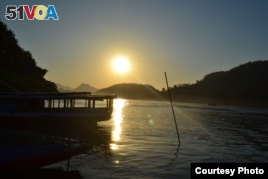“I come to this initiative with a passionate commitment to trying to make sure that its natural resources and its unique ecosystem is preserved,” U.S. Secretary of State John Kerry said recently when he led the U.S. delegation to the Sixth Lower Mekong Initiative Ministerial Meeting in Bandar Seri Begawan, Brunei.

Sunset at The Mekong River
“[Mekong] is a special river. It sustains the lives of over 70 million people, and it is a powerful economic engine that connects the peoples of [many] countries.
The Lower Mekong Initiative is the forum for addressing cross-border development and policy challenges facing the five Lower Mekong partner countries of Cambodia, Laos, Myanmar, Thailand, and Vietnam; and it has six areas of focus: agriculture and food security, connectivity, education, energy security, environment and water, and health, as well issues related to improving gender equality.
On Agriculture and Food Security, the focus is to expand agricultural trade and investment; and to increase private sector, farmer, and civil society engagement.
On Connectivity, the United States is committed to the ‘Connect Mekong’ platform, drawing on U.S. expertise to promote infrastructure connectivity, and leveraging public-private partnerships.
On Education, the focus is on building educational ties and cooperation among the Lower Mekong Initiative member-nations on education policy and reform.
On Energy Security, the priority is to increase security through developing unconventional and renewable sources of energy, ensuring access to energy, and enhancing regional energy interconnectivity.
On Environment and Water, the goal is to advance economic growth and sustainable development through transnational dialogues and programs that improve the management of water and natural resources.
On Health, priorities include fighting communicable and emerging infectious diseases; prevention and control of counterfeit and substandard medications; regional collaboration to support International Health Regulations implementation; identifying and sharing best practices; and responding to public health emergencies from chemical, radiation and nuclear events.
“The Lower Mekong Initiative is a good example of regional leadership that uses local expertise and wisdom in order to guide the direction of the region’s development,” Secretary Kerry said in conclusion. “The United States is prepared to partner with [the Lower Mekong countries] in this effort.”